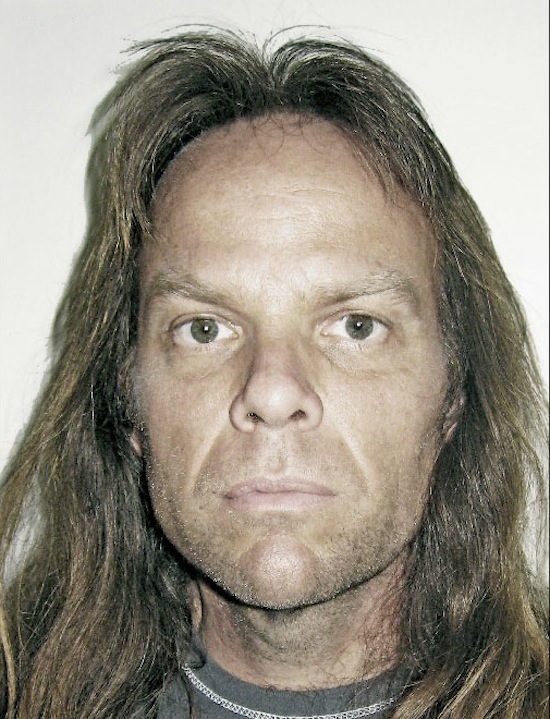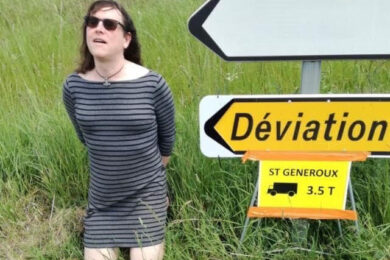I’m a native Texan
I’m the only Swan who lives in Austin, and I’ve lived there since ’85. I love it.
I do have Nordic blood
My father’s father came from Scotland, but he is a Norwegian from Scotland. So my family is from Norway but way back, they’ve been in America for a long time. They came over 150 years ago, but I don’t know much about those people. Unfortunately it’s this thing that happens a lot with Americans, we move across the ocean and lose so much of our family.
The Jackson Five changed my life
My sister gave me some Jackson Five records when I was four or five years old. I loved them, and I wanted to be Michael Jackson. I remember my parents even took me to see the Jackson Five when I was about six-years-old, it was one of the formative experiences of my life. After that I would go and see the marching bands in the half time shows of football games. I grew up in Texas and wasn’t interested in football, but I liked watching the guys in the marching bands play drums. I thought that looked like fun, and that’s when I decided I wanted to be a drummer. I first started taking drum lessons when I was nine, and now I’m 47, so however long that is, that’s how long I’ve been playing. 38 years.
I am classically trained
I had lessons and played in the symphony and stuff, I had teachers from when I was very young. I had about four or five different teachers. One was this kind of famous jazz guy near Houston called Joe Raynor and he was pretty great. I played in a bunch of bands, I play in Shearwater, I played with Arthur Brown, from the Crazy World Of Arthur Brown, I love that guy, he’s a dear friend and a total sweetheart.
I’m as comfortable with wood and metal as with drums
My grandfather worked with tools and wood, anything metal, and my father also. It’s a tradition in our family to be good friends with everything in the tool and mechanical world. That’s funny, you reminded me, I had a dream about my grandfather’s house last night. He had these shops, one part was devoted to metalworking tools, and I remember as a little kid just wandering round, I grew up around these tools and that was as much part of my childhood as music was.
Here’s how I became Thor:
When I was about 20 years old, I was working in a deli in Austin, there were all these freaks at the deli because they’d hire longhairs and people with tattoos. There were four guys there called Michael. The one who was there first got to keep the name Michael, and this guy in a punk band who worked nights there had started calling me Thor because he thought I looked like Thor, and it just stuck.
My worst depression was liberating
I was 27 when my worst experience of clinical depression struck. I was suicidal for about eight months. It left me pretty fearless of anything in this world, the worst thing I can imagine was in my brain for the best part of a year. It was a horrific place to be. Living through that did give me a kind of clarity and sense of immediacy and urgency, feeling like now is the time to do what I want to do because I have this death, this clear image of death, in view all the time. That sounds sad and negative, but it isn’t, it’s motivating if anything.
After that, I approached Swans
I feel lucky to have hooked up with… well, somewhat lucky, it was intentional. I called them or wrote them postcards or letters, I stalked them, basically. I could tell by looking at my Swans records that there was some turnover in the personnel in that band, so that’s how I started playing with Swans. I wrote Michael and Jarboe a fan letter, then I met them when they came to Austin.
Playing with Swans is mind over matter
When people go dancing and exert the most effort of any time in their life, it’s sort of like that. The music has you moving in that way, you turn off the parts of the brain that would otherwise tell you that you’re fatigued and exhausted. I’ve done a lot of physical things including construction work, and I mostly ride bicycles to get around in Austin, so I have decent cardio fitness anyway, but there’s something about rhythm and music that lets us go beyond our usual limits of fatigue. I suffer from depression, and mostly I have a handle on it. But like anybody else I have mood swings, and at the beginning of a show if I feel like death or really depressed, by the time I’m at the end of the show I feel at least neutral or somewhat euphoric. That’s what it should be for the crowd. Yes there’s a lot of negative rage and anger energy in that music too, but also it’s hopefully euphoria-inducing as well.
Rehearsals for Swans are like boot camp
We rehearse six or eight hours a day. Oftentimes if it’s the beginning of a tour where we haven’t been touring for a while we’ll rehearse six hours a day for a month. It’s pretty gruelling. I’ve been in other bands that work really hard, but not that hard. I’ll say that this band does work really hard. It’s Michael’s way of working. Different band leaders work in different ways, and Michael wants to hear what everyone is doing individually.
I build houses, I build instruments
My house is pretty much completely new, and I’ve built houses for other people too. When music isn’t paying my bills, that’s how I pay my bills. I’m a carpenter, I make furniture and I make a lot of the instruments that I play. I started making instruments when I was about 13 because I had a lot of materials there, I couldn’t afford a lot of instruments, so I thought I could make reasonable facsimiles of those that I wanted. Then a few years ago I got this book by Bart Hopkin about the science of making sound, what are the sounds that we like to hear in music, how are they made. I wish I’d had that book all the while, because it has definitely improved my instrument-making game.
I came up with a lot of good weird instruments just by trial and error and experimentation. In Swans I play an electric hammer dulcimer and an electric viola that I made. I built some of the drums that I used on the first tour, but then I phased them out. The problem with carrying around too many of your own instruments is now that airlines charge so much for excess baggage it’s too expensive to travel.
I use plumbing hardware when I play the drums
A lot of the time when I’m drumming I don’t use sticks, I use these plastic tubes. I’m a plumber, it’s one of my day jobs. There’s this new kind of fresh water line called PEX they’re using instead of copper for water lines because the price of copper has got so high, and PVC emits dioxins, so nobody wants their drinking water going through PVC any more. PEX is real flexible, and is a great consistency for playing insanely hard because it’s got more flex than wood but you still get the huge volume, and it’s easier on the cymbals. Me and Phil were breaking so many cymbals that first year that we restarted this band. By using PEX I save a lot of cymbals and I save a lot of wear on my own joints. This stuff is insanely tough, you have to cut it with hedge cutters. But it’s really great when you’re playing that hard.
I have definitely become more Thor-like
I’ve had to live up to the name, which can be a good thing, take on a ridiculously grandiose name and aspire to live up to it. That’s my advice to young people, change your name to something absurd and live up to it.
I’m a sex symbol after the sword picture?
That’s excellent news.
There’s a sense of pride in carpentry
It’s a bit repetitive like doing any other job, but then there are parts where you’re ‘ah, look, I’ve finished this thing, I’ve put this door in this hole and it opens really smoothly, and now people for decades will walk through this door and they won’t even have to think about how much time it took for me to get it to move this smoothly’.
The biggest similarity between carpentry and Swans is the physicality
It makes demands on your body, but there aren’t many things that are dissimilar. It’s all about working with these tools, working so that you’re training parts of your brain to know what to expect from different materials.
The great thing about making music is working with people
Carpentry and plumbing are very solitary, and as we get older we tend towards reclusiveness and having things our own way. Music demands that you make compromises with people and you trust the people you’re working with. Carpentry doesn’t demand that so much, a lot of the time I just feel like ‘I’m just going to do this job by myself, I could do it a little quicker with someone else, but then I have to be managing the helper’.
Playing music, you walk into it knowing that it’s going to be a compromise, and in the case of working with Swans it’s not a democracy, Michael is the leader. In my early days I just played drums because I thought they were cool, but then I had this little crisis. ‘Oh I’m a drummer, I’ll never be a band leader, I’ll always be a side-man’ – I thought it was a crummy thing to be. Now, though, I think it’s so great, because everyone always needs a good solid drummer who’s not an addict or a pain in the ass to travel with. I can call up and write a fan letter to whoever I want and say ‘hey, if you ever need someone to play drums and maybe clarinet and trombone and these other weird-ass instruments give me a call… and if your plumbing is fucked up, which it probably is’. That’s the great thing about being a plumber, water will eventually destroy anything, there will never be a material, not even PEX, someday it’ll need to be fixed. Eventually we will all be washed away.
Swans are about to embark on a UK tour including a special concert for the Michael Gira-curated Mouth To Mouth festival at KOKO on April 4th. Info here>/a>




